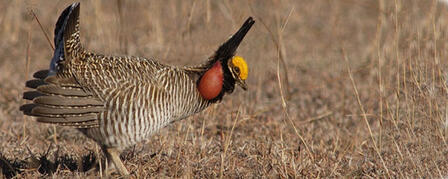PLJV CONOCO-PHILLIPS GRANTS HELP GREAT PLAINS WILDLIFE

$800,000 dedicated to four state projects, two in Kansas
WICHITA — During a Playa Lakes Joint Venture (PLJV) Management Board meeting in Wichita in January, board members approved $100,000 in ConocoPhillips grants to support four conservation projects with matching partner contributions totaling $694,681, continuing the company’s 20-year effort to improve wildlife habitat in Colorado, Kansas, and Oklahoma. Two of the four projects target Kansas.
"The proposals were all very high quality this year, making for some tough decisions," says Christopher Rustay, PLJV conservation delivery leader. "The four projects that were chosen will greatly improve habitat conditions in the Great Plains."
Chestnut Slough Habitat Enhancements in Weld County, Colorado
This year’s ConocoPhillips grant will help Ducks Unlimited make enhancements to one of the most important waterfowl roosting sites in the central South Platte River watershed. The project will conserve non-breeding waterfowl habitat by enhancing the hydrology of a warm-water slough and improving shallow-water wetlands and wet meadows through the installation of water-control structures. The increased size and quality of slough, marsh, and wet meadow habitats will help non-breeding waterfowl maintain body condition by providing excellent forage and roost habitat in a stretch of the river deficient in these habitat types. These activities will also benefit other wetland-dependent wildlife by increasing plant biodiversity, improving the time wetlands are covered by water, and establishing greater habitat diversification.
Wetland Enhancement & Water Conservation in Quivira National Wildlife Refuge
One of the funded projects in Kansas will restore and enhance wetland habitat at Quivira National Wildlife Refuge (QNWR) that benefits many birds currently considered PLJV priority species, such as the northern pintail, mallard, greater white-fronted goose, snowy plover, American avocet, long-billed dowitcher, whooping and sandhill crane, and American white pelican. Narrow, deep, open water sites next to dikes and outlet structures and cattail-choked sites will be transformed into moist-soil habitat that can be more efficiently drained and flooded to encourage annual plant and invertebrate production, increasing forage resources for shorebirds and waterfowl.
Lesser Prairie-Chicken Habitat Restoration, Outreach, and Education in Kansas
Pheasants Forever is partnering with the Natural Resources Conservation Service (NRCS), the Kansas Department of Wildlife and Parks, and U.S. Fish and Wildlife Service to fund three farm bill biologists positions. These biologists will provide technical assistance, outreach, and education to farmers, ranchers, and land managers about the importance of restoring and improving habitats for lesser prairie-chicken, northern bobwhite quail, and other species of concern in southcentral Kansas. The biologists will also provide information about how to use federal, state, and local conservation programs to offset the costs of making needed improvements. They will work closely with the partners and other area resources to increase enrollment in these programs. This program was funded through a ConocoPhillips grant last year as well, resulting in more than 8,000 acres of new or improved habitat.
Statewide Burn Association in Oklahoma
The ConocoPhillips grant will help the Oklahoma Wildlife and Prairie Heritage Alliance, the High Plains RC&D Association, and the Oklahoma Conservation Commission form a statewide burn association. Burning is an important tool in wildlife habitat restoration because fire suppression has a detrimental effect on grasslands. Without controlled burning, invasive species such as eastern red cedar expand rapidly. Removal of these invasive species by mechanical means has failed to make significant reductions. This project will improve support for local burn associations and allow more prescribed burns through statewide coordination, sharing of data, development of regional smoke plans, and a statewide platform that will provide access to burn insurance.
Since 1990, ConocoPhillips has contributed more than $2 million to the PLJV-ConocoPhillips Grant Program and supported more than 250 conservation projects throughout the PLJV region.
-30-









